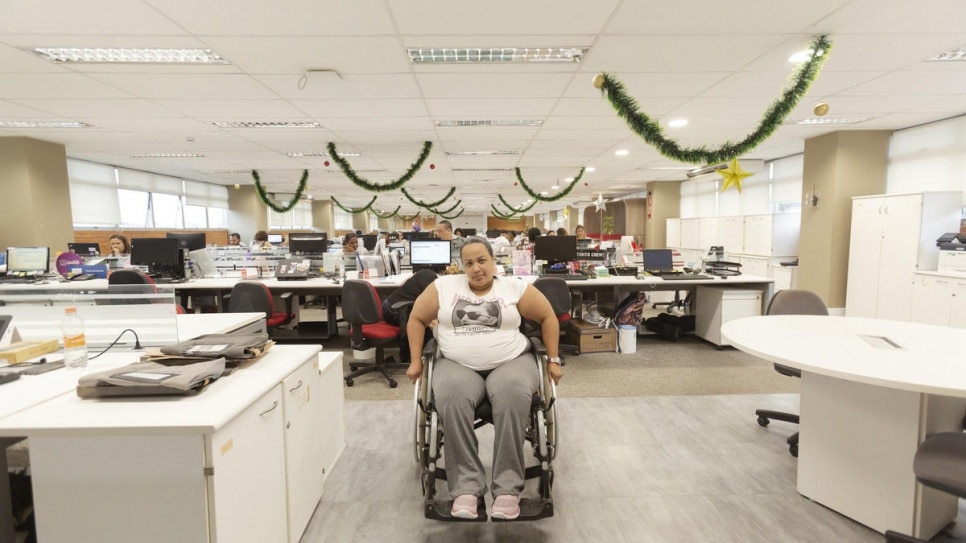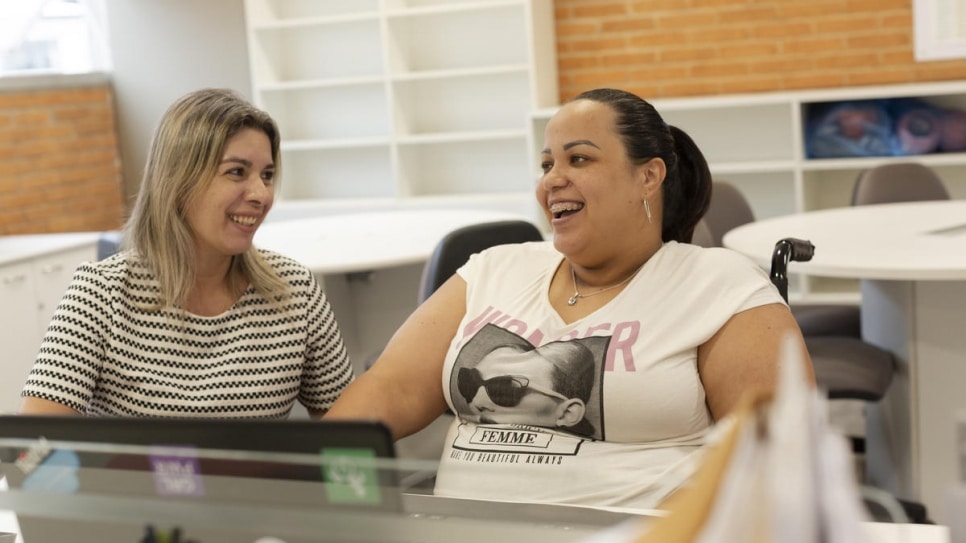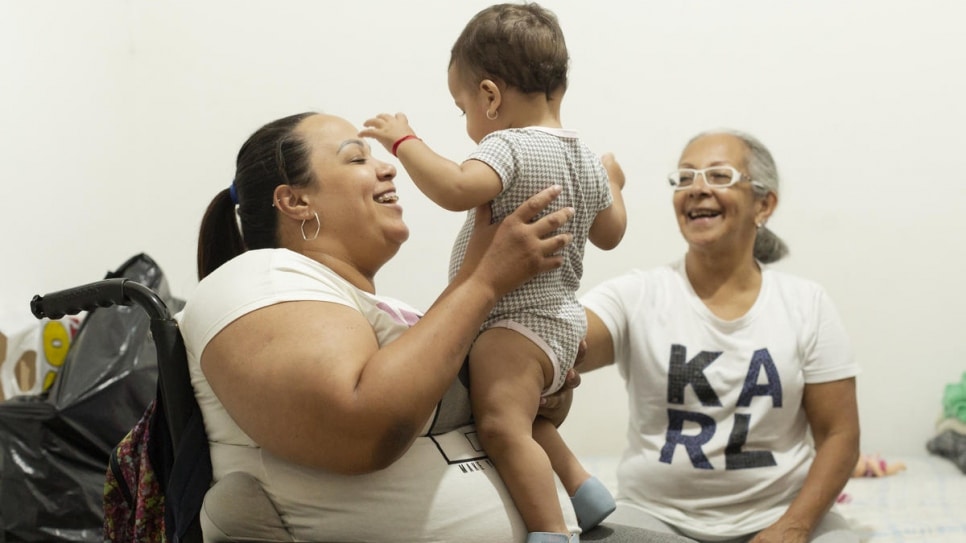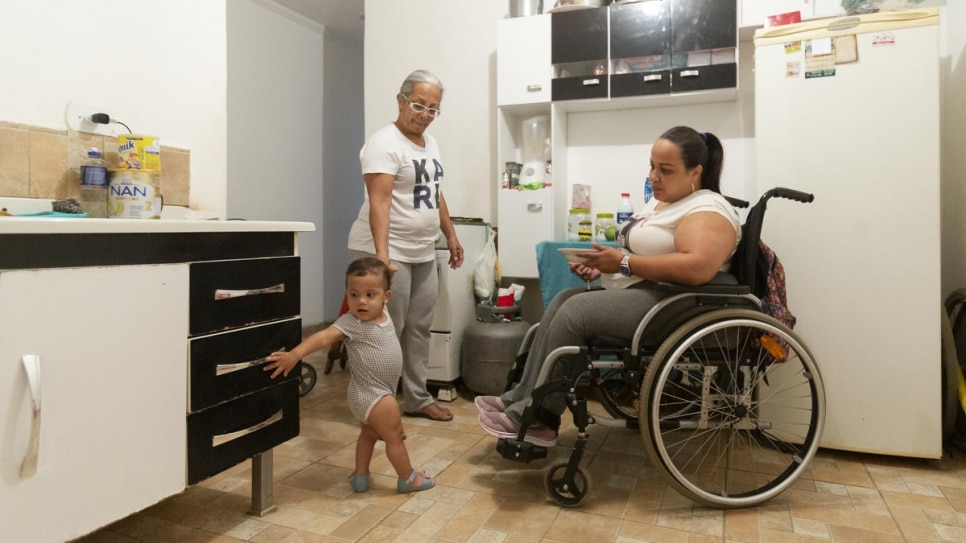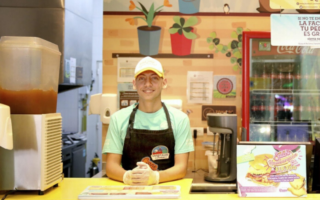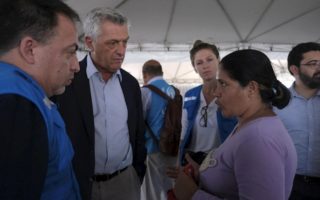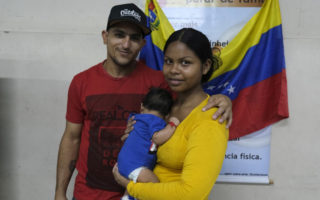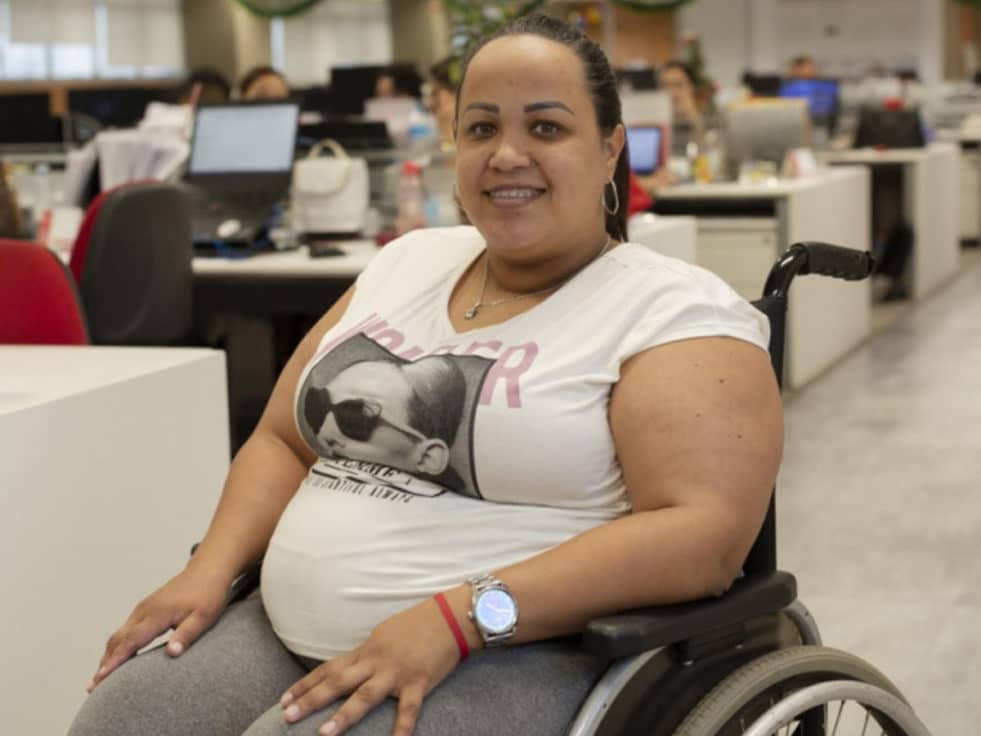
Venezuelan Gabriela Peña found safety in São Paulo where she works in the Human Resources department of a laboratory. © UNHCR/Gabo Morales
By flying thousands of Venezuelans out of a remote Amazonian state to cities with better job prospects, an ‘interiorization’ programme helps refugees get off to a fresh start.
She now had access to food and medicines in the remote, sparsely populated state in the Amazon region, but she was unable to find the work she desperately needed to pay for them.
“I tried and tried to find something—anything,” said Gabriela, a 32-year-old former customs agent who has got around in a wheelchair since a childhood accident left her paralyzed from the waist down. “But it was almost impossible.”
Some 200,000 of the estimated 4.8 million Venezuelans who have left their country amid the ongoing crisis there have sought safety in neighbouring Brazil. The vast majority, like Gabriela, make the trip overland, crossing the border into Roraima.
“Without the flight that brought us here, it wouldn’t have been possible.”
Once there, many are effectively stuck in the state. The capital, Boa Vista, is a grueling 16-hour bus ride from the only other major city which can be reached by land, Manaus, and a costly plane ride away from every other major Brazilian metropolis.
The sheer number of Venezuelans in Roraima has made finding steady work there a challenge. Fortunately, Gabriela’s luck changed after she, her mother, and husband were relocated from Boa Vista, population 400,000, to São Paulo, Brazil’s 21-million-strong economic powerhouse.
There, Gabriela, who holds a university degree in administration, was hired in the Human Resources department of a diagnostics laboratory, while her husband has found work as an auto mechanic. Thanks to the steady paychecks, the family has rented a modest two-bedroom apartment, and Gabriela is expecting her first child.
“Here in São Paulo, getting a good job is easy,” she said. “But without the flight that brought us here, it wouldn’t have been possible. In Roraima, I just don’t see how we would have scraped together the money to buy the plane tickets ourselves.”
More than 16,000 Venezuelan refugees and migrants have taken part in the so-called “interiorization” programme, which is run by the Brazilian government, with support from the UNHCR, the UN Refugee Agency, as well as the International Organization for Migration. UNHCR has worked to increase the number of shelters that receive those relocated, so that as many people as possible are able to take advantage of the relocation flights. The agency also distributes cash payments to some beneficiaries to allow them to buy basic household goods in their new host cities.
Beneficiaries have been relocated to nearly 300 cities throughout the width and breadth of this continent-sized nation, from Rio de Janeiro, in south-east Brazil, to the tiny town of Marco, in the northeastern state of Ceará.
Often, beneficiaries are relocated on flights operated by the Brazilian Air Force from temporary shelters in Boa Vista to shelters in their new host cities that provide them a stable base from which to search for work and more permanent lodgings. Others are flown to join family members already living in other parts of Brazil, while others are recruited before leaving Boa Vista by companies in need of labour.
That was the case of Julio Abreu Machado, a 25-year-old who fled the southern Venezuelan state of Bolívar, driven out by hunger, widespread insecurity and a generalized breakdown of the social order back home. While arriving safe and sound in Boa Vista was a relief, allowing him to fulfill basic needs that were impossible to meet back home—in Venezuela, Julio had dwindled from 120 kilograms to just 80 as a result of the food shortages—he struggled to find a job to keep himself afloat.
“I wore out the soles of my shoes from pounding the pavement every day, searching for work,” he said. After short stints at several odd jobs—some of which paid significantly less than Brazil’s legal minimum wage of around US$235 a month—Julio was hired to work at a meat packing plant owned by industry leader JBS and relocated to the interior state of Mato Grosso do Sul.
“The interiorization programme was like a rebirth for our family.”
Since he started at the plant some eight months ago, Julio has been promoted from a worker on the sausage assembly line to an assistant supervisor for the sector. With his salary, he rented the house where he lives with his wife, Lorena, and their Brazilian-born son, 1.5-year-old Paulo, as well as Lorena’s identical twin sister and her partner.
“The interiorization programme was like a rebirth for our family,” said Julio, who hopes to save up enough to start a food truck as side business. “Our lives right now would be vastly different—and worse—if we hadn’t been brought here to Mato Grosso do Sul.”
The economic inclusion of refugees was one of the topics under discussion at the Global Refugee Forum, a high-level meeting held in Geneva 17-18 December. States, the private sector and other actors announce high-impact contributions aimed at giving refugees a chance to use and further develop their skills and contribute to economic growth in their host communities.
Originally published on UNHCR on 27 December 2019


